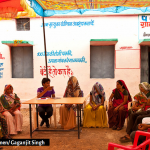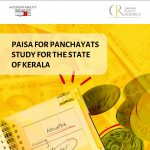
Why decentralization matters
21 May 2013
This article was also published in the Financial Express on May 11, 2013.
On the 24th of April 2013, India celebrated the 20th anniversary of the passage of the 73rd and 74th constitutional amendments mandating the creation of a third tier of elected government -Panchayati Raj Institutions (PRIs) in rural areas and municipal councils in urban India. When passed, these amendments embodied the aspiration of transforming India’s top-down, District Magistrate Raj babu culture through greater decentralization. However, 20 years on, there is little argument that this aspiration remains unfulfilled and efforts to decentralize government, despite the constitutional provisions have been halfhearted at best. Very few powers and responsibilities have been actually devolved – local government expenditure in India accounts for just about 7% of total government spending in India. And even when monies have been devolved, such as in the MGNREGA which mandates that 50% of the total district expenditure be undertaken through the Gram Panchayat, implementation continues to be the domain of the local bureaucracy which is accountable to the district administration and not to Panchayats.
Against this halfhearted devolution is a raging debate in India over whether decentralization is in fact the right instrument through which to initiate the transformation of the Indian state. Corruption, elite capture and incompetence are often furnished asreasons not to empower local governments. But actual evidence of India’s experience with decentralization presents a far more nuanced picture. No doubt corruption and elite capture are serious problems but local governments also offer ordinary citizens the only real platform through which they can meaningfully participate in government and this participation, despite the threat of elite capture, hasthe potential both for improving access to government services but also for improving the quality of democracy more generally. There is an important caveat to the evidence I am going to present below – it deals entirely with rural local governments or Panchayats. This is because research on urban local bodies is extremely thin.
Now to the evidence. One of the simplest and most widely supported arguments for decentralization reforms is that decentralization brings governments closer to people and in so doing enables governments to better respond to citizens’ needs and priorities. Proximity to citizens’ also increases the potential of scrutiny and thus greater decentralization can, at least in theory, result in greater accountability.
In the absence of any serious devolution of powers and responsibilities to local governments in India, it is difficult to assess the validity of this claim in the Indian context. However, evidence does suggest that when citizens’ participate in local government processes like gram sabhas we do see improvements in access to government resources. For instance, a 2005 study by Timothy Besely, Rohini Pande and Vijayendra Rao finds that gram sabha meetings are positively correlated with better targeting of BPL cards to the poorer villagers. Interestingly, they also find that the odds of a politician’s household receiving a BPL card is lower in villages where gram sabha’s were held suggesting that gram sabha’s can in fact have a “disciplinary effect” on local political behavior thus ensuring greater accountability.
Another way of evaluating decentralization is through the lens of the effects of reservations in Panchayat elections on resource allocation. One of the most interesting, and widely studied, provisions of the 73rd amendment is the mandate to reserve one-third of all seats for women. A 2004 study by Esther Duflo and Raghavendra Chattopadhyay in West Bengal and Rajasthan found that reservations for women had some effect on the nature of public goods investments – villages with women panchayat presidents had significantly more investments in drinking water facilities than villages with male presidents. Another study of 11 states by Esther Duflo and Petia Tapolova corroborated these findings. These differences in investments are associated with the fact that the presence of women in Panchayats encouraged greater female participation in government both by encouraging more women both to be present at gram sabha meetings and also to petition panchayats resulting in greater investments in public goods prioritized by women. These studies thus substantiate the view thatdecentralization can indeed improve access to the provision of public goods and ensure alignment with local needs and priorities.
But the benefits of decentralization are not limited to improvements in access to services. By creating spaces for participation like the gram sabha, decentralization reforms have the potential to transform the very rules of engagement between the poor and the state because these spaces allow ordinary people to question, petition and directly demand benefits from the state. In 2010, Vijayendra Rao and Paromita Sanyal analysed the transcripts of over 300 gram sabha meetings. Their analysis tells a fascinating story of how poor people use the gram sabha as a space to discuss routine problems, access public goods and on occasion even challenge local inequalities. Most importantly, through these discussions, the gram sabha enables ordinary people to interact with state actors as equals. To quote Rao and Sanyal “the gram sabha allows …(ordinary people)… to momentarily discard the stigma of their ascriptive identity and low economic status and slip into their identity as citizens with equal rights in the eyes of the state.”
Of course gram sabha’s are rarely held and even when they are, discussion on public programs and beneficiary selection is rare. Moreover, it would be naive to suggest that deeply entrenched inequalities of caste, gender and economic status that mark everyday life in India miraculously disappear when citizens interact with local governments. But what the evidence does highlight is their potential for deepening democratic practice by enabling citizens to participate, question and demand from government. And in the long term it is only through greater democratic engagement that we are likely to see improvements in the quality of our democracy. The challenge for decentralization reforms in India is to strengthen these spaces of engagement. This can only be effective if local governments are in fact handed over the powers and resources needed to respond to people’s needs and priorities. And at the moment there is no evidence of political will to do just this.





